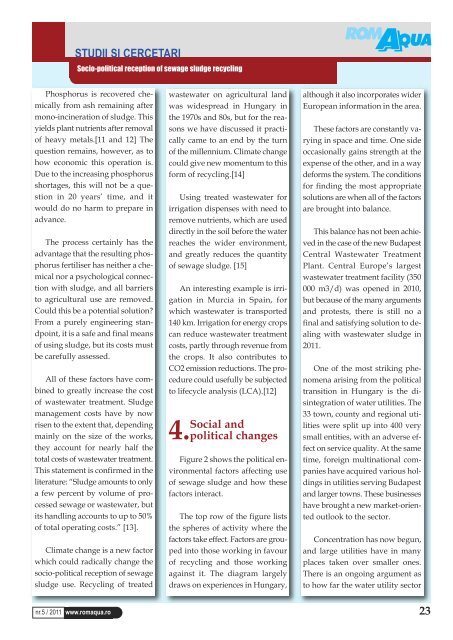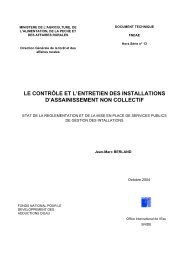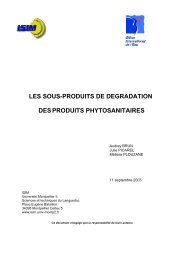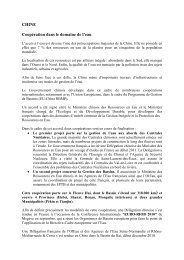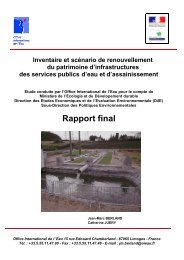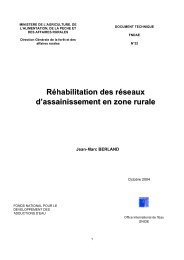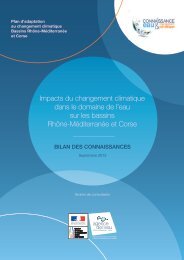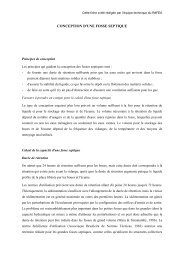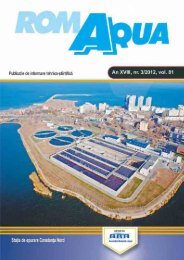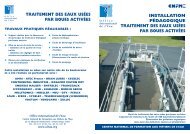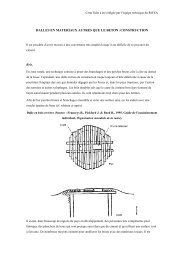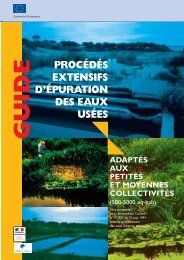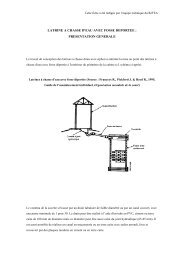vol 77 n° 5 2011 - Office International de l'Eau
vol 77 n° 5 2011 - Office International de l'Eau
vol 77 n° 5 2011 - Office International de l'Eau
Create successful ePaper yourself
Turn your PDF publications into a flip-book with our unique Google optimized e-Paper software.
STUDII SI CERCETARI<br />
socio-political reception of sewage sludge recycling<br />
Phosphorus is recovered chemically<br />
from ash remaining after<br />
mono-incineration of sludge. This<br />
yields plant nutrients after removal<br />
of heavy metals.[11 and 12] The<br />
question remains, however, as to<br />
how economic this operation is.<br />
Due to the increasing phosphorus<br />
shortages, this will not be a question<br />
in 20 years’ time, and it<br />
would do no harm to prepare in<br />
advance.<br />
The process certainly has the<br />
advantage that the resulting phosphorus<br />
fertiliser has neither a chemical<br />
nor a psychological connection<br />
with sludge, and all barriers<br />
to agricultural use are removed.<br />
Could this be a potential solution?<br />
From a purely engineering standpoint,<br />
it is a safe and final means<br />
of using sludge, but its costs must<br />
be carefully assessed.<br />
All of these factors have combined<br />
to greatly increase the cost<br />
of wastewater treatment. Sludge<br />
management costs have by now<br />
risen to the extent that, <strong>de</strong>pending<br />
mainly on the size of the works,<br />
they account for nearly half the<br />
total costs of wastewater treatment.<br />
This statement is confirmed in the<br />
literature: “Sludge amounts to only<br />
a few percent by <strong>vol</strong>ume of processed<br />
sewage or wastewater, but<br />
its handling accounts to up to 50%<br />
of total operating costs.” [13].<br />
Climate change is a new factor<br />
which could radically change the<br />
socio-political reception of sewage<br />
sludge use. Recycling of treated<br />
wastewater on agricultural land<br />
was wi<strong>de</strong>spread in Hungary in<br />
the 1970s and 80s, but for the reasons<br />
we have discussed it practically<br />
came to an end by the turn<br />
of the millennium. Climate change<br />
could give new momentum to this<br />
form of recycling.[14]<br />
Using treated wastewater for<br />
irrigation dispenses with need to<br />
remove nutrients, which are used<br />
directly in the soil before the water<br />
reaches the wi<strong>de</strong>r environment,<br />
and greatly reduces the quantity<br />
of sewage sludge. [15]<br />
An interesting example is irrigation<br />
in Murcia in Spain, for<br />
which wastewater is transported<br />
140 km. Irrigation for energy crops<br />
can reduce wastewater treatment<br />
costs, partly through revenue from<br />
the crops. It also contributes to<br />
CO2 emission reductions. The procedure<br />
could usefully be subjected<br />
to lifecycle analysis (LCA).[12]<br />
4.<br />
social and<br />
political changes<br />
Figure 2 shows the political environmental<br />
factors affecting use<br />
of sewage sludge and how these<br />
factors interact.<br />
The top row of the figure lists<br />
the spheres of activity where the<br />
factors take effect. Factors are grouped<br />
into those working in favour<br />
of recycling and those working<br />
against it. The diagram largely<br />
draws on experiences in Hungary,<br />
although it also incorporates wi<strong>de</strong>r<br />
European information in the area.<br />
These factors are constantly varying<br />
in space and time. One si<strong>de</strong><br />
occasionally gains strength at the<br />
expense of the other, and in a way<br />
<strong>de</strong>forms the system. The conditions<br />
for finding the most appropriate<br />
solutions are when all of the factors<br />
are brought into balance.<br />
This balance has not been achieved<br />
in the case of the new Budapest<br />
Central Wastewater Treatment<br />
Plant. Central Europe’s largest<br />
wastewater treatment facility (350<br />
000 m3/d) was opened in 2010,<br />
but because of the many arguments<br />
and protests, there is still no a<br />
final and satisfying solution to <strong>de</strong>aling<br />
with wastewater sludge in<br />
<strong>2011</strong>.<br />
One of the most striking phenomena<br />
arising from the political<br />
transition in Hungary is the disintegration<br />
of water utilities. The<br />
33 town, county and regional utilities<br />
were split up into 400 very<br />
small entities, with an adverse effect<br />
on service quality. At the same<br />
time, foreign multinational companies<br />
have acquired various holdings<br />
in utilities serving Budapest<br />
and larger towns. These businesses<br />
have brought a new market-oriented<br />
outlook to the sector.<br />
Concentration has now begun,<br />
and large utilities have in many<br />
places taken over smaller ones.<br />
There is an ongoing argument as<br />
to how far the water utility sector<br />
nr.5 / <strong>2011</strong> www.romaqua.ro<br />
23


